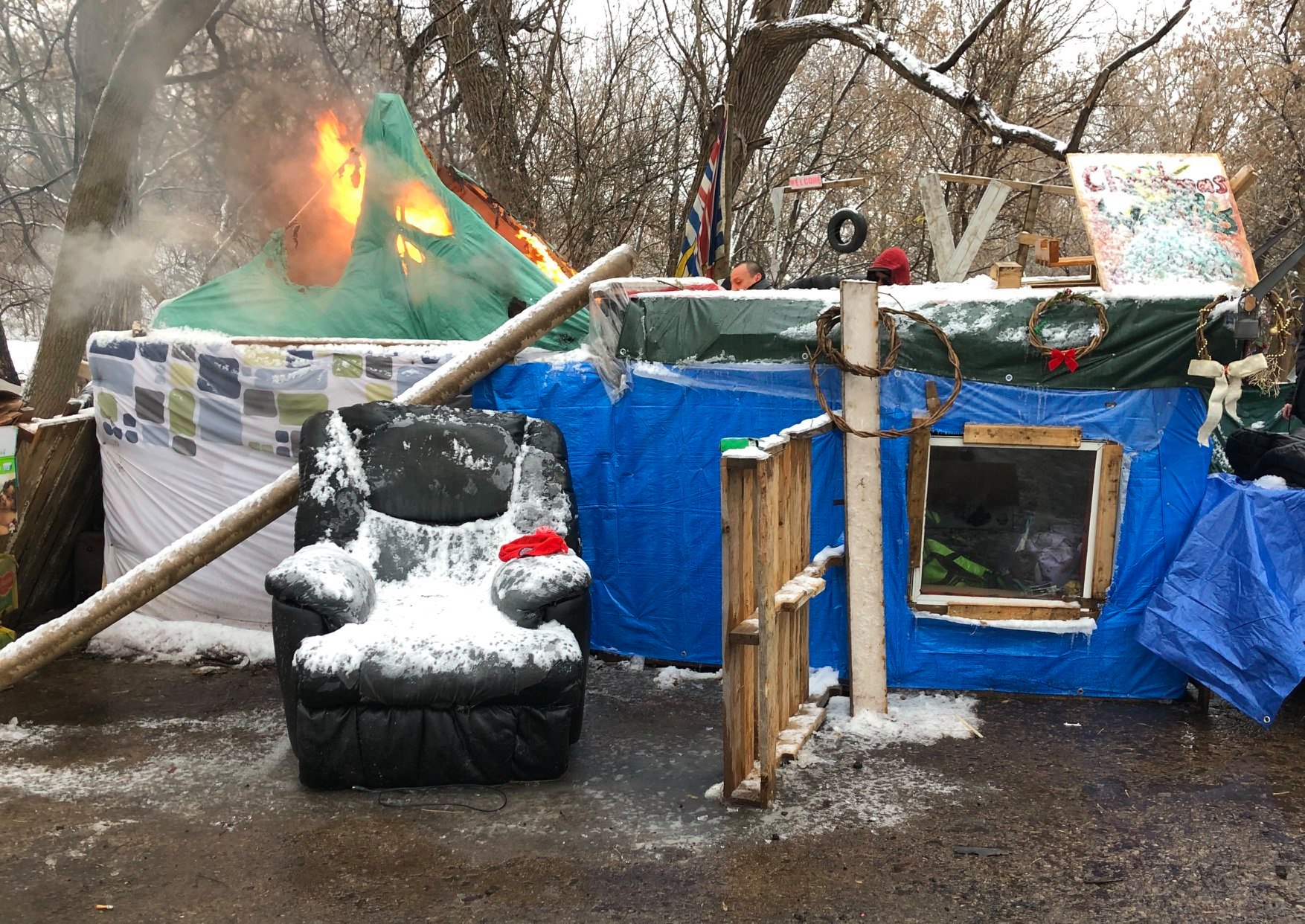
By Becca McLellan
I went to the Welcome Love encampment Wednesday morning, which I haven’t had much opportunity to do because of how much is on my plate. The group received a final eviction notice Tuesday, and police were scheduled to escort residents from the property Wednesday at 9AM.
I watched a small but powerful team of women, mostly from the faith community, urge people from their tents with coffee and donuts as the police and by-law enforcement officers watched from the road, waiting to be told when to start sending people on their way.
Groggy, frustrated, and fearful people emerged from their shack and tent homes, anxiously sorting which of their worldly possessions mattered the most. Volunteers brought them bins and helped to carry their items out of the encampment area.
The Welcome Love encampment rests on a mix of city-owned and private property. The timing of the eviction was about as kind as it could be… an emergency shelter was created to handle the overflow of people once the main shelters were at capacity. The emergency shelter opened on December 2nd. The eviction was scheduled for December 4th.
Law enforcement officers were peaceful and clearly hoped to not have to remove anyone from the premises forcibly.
Compassionate volunteers encouraged residents to move their things out of the area. They brought bins and were desperately trying to arrange transportation and storage of the residents’ personal items.
Some folks yelled in frustration, swearing in angry helplessness. Others shrunk back.
One person, who had spent weeks building an impressive shack from skids and tarps, lit their home on fire because the idea of other people destroying their home was more than they could bear.
The blaze engulfed their home, but was put out by first responders before anyone could be injured. It didn’t even have the chance to spread (thankfully).
“I don’t know where to go,” said one person, who has experienced significant traumas in shelters in the past and has yet to work themselves up to the point of being able to try one again. At this point, only the 12-hour shelter has beds available.
Over the last 7 years, the housing market has gone crazy. Many properties have literally doubled in value. Rent has gone up… sometimes by 100%. The vacancy rate is only 1%.
People on “welfare,” or OW as it is called in Ontario, don’t really stand a chance when they’re competing against 20 other contenders for the same apartments.
Racism is reportedly a huge barrier to obtaining apartments, too.
In Brantford, our affordable housing wait list is 12 years. It has been climbing readily for years.
Honestly, we are just behind in our local housing stock. We have more people than homes, and we NEED basic housing.
Some people I care about and respect are pretty tough love about this situation, and talk of how these folks should just go find a job.
I’d love that.
But —we’re not talking about a seasoned employee down on his luck because he and his wife had a spat or something. People like that are easy to help and don’t stay homeless for long.
The most vulnerable homeless individuals tend to have a few things in common:
- They experienced significant abuse and neglect as children (sexual abuse included)
- They likely did not have supports from even one or more parents while growing up
- They are estranged from family now
- They have experienced homelessness before
- Their mental illnesses have been activated by the constant, intense stress of homelessness
- They have developed life-consuming addictions (in Brantford, two reigning drugs are fentanyl and methamphetamine)
- They have been in “survive” mode for so long that “thrive” is a very strange concept
- Many have experienced additional traumas (like losing their children) that have just landed them in a pit of despair
- Many have lost hope that things could get better
- Many are living under the consequences of multi-generational traumas
The longer you live in crisis, the harder it is to achieve wellness. Crisis is a strangling, horrid state of being. It literally chokes life out of you.
Homelessness is absolutely a form of crisis. Addictions is a form of crisis. Unresolved traumas are a form of crisis.
Add it all together, and it becomes a deeply overwhelming, life-consuming, seemingly unsurmountable barrier to moving forward.
In this city, there are people who just need a little help and they will be back on their feet, participating in the work force, and will probably be fine.
There are other people who need a lot more help… who need the chance to learn what safety means, what sobriety can look like, and what it means to have safe people in their lives. With the right, persistent help, they will make it, too.
There is another group that has been so broken by chronic crisis that they will always need help and support to thrive.
Do they deserve to live?
That’s the question I sometimes hear. Not everyone can just up and fix up their lives.
Homelessness is COMPLICATED.
But right now, we don’t have enough places for people to live, even if they could pay rent all on their own.
The federal, provincial, and municipal governments MUST be a part of this, but they are not enough. If we believe their lives matter, we need to address this.
How?
We need to create more housing, and we need to try to keep rent under $1000/month. We can take some great examples from organizations like Habitat for Humanity on how volunteerism can keep initial costs down.
We need to keep people connected to the many great supports that exist. There is so much great help that it’s hard to navigate. The more people who have an up to date understanding of the help that already exists, the better.
We need to continue to support the supports through donations, volunteerism, and other forms of practical help.
We need to clarify that this is something we care about as a community. You do not need to be fully versed. You just need to care, speak up, and roll up your sleeves whenever you have the opportunity.
If our vulnerable brothers and sisters matter, then we need to fix this broken staircase to wellness.
Becca is the Director at Why Not Youth Centre and a community development activist in Brantford, ON.







